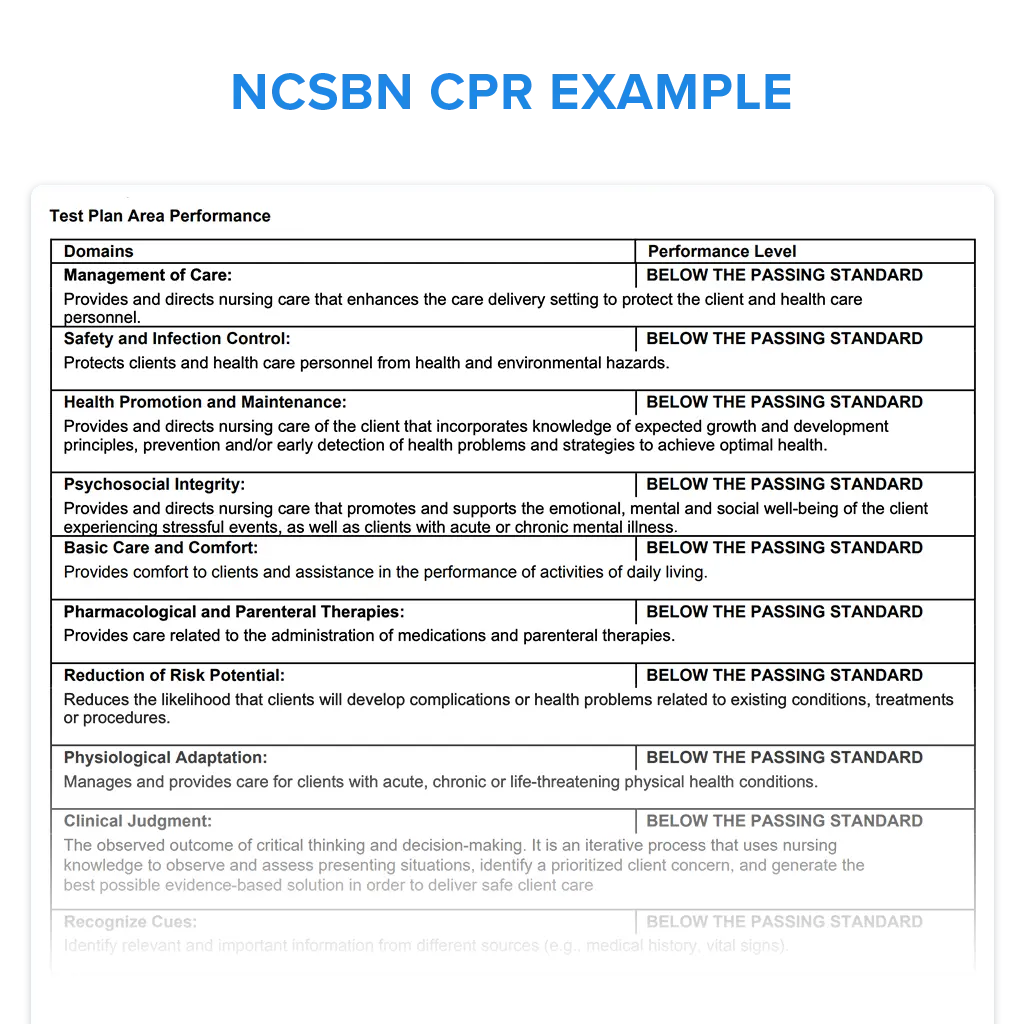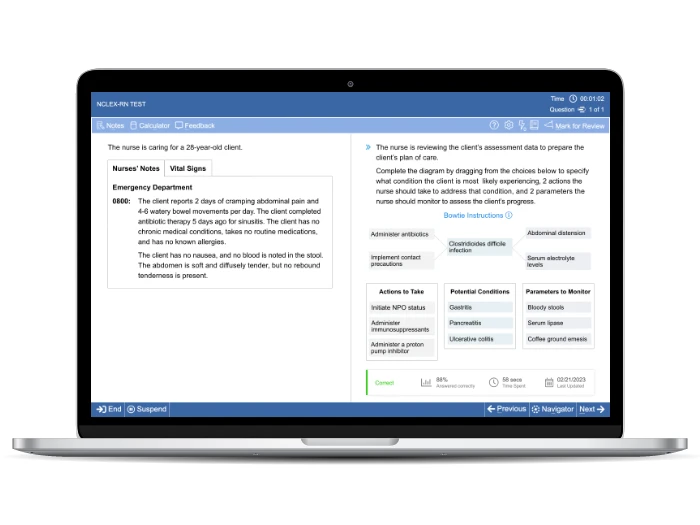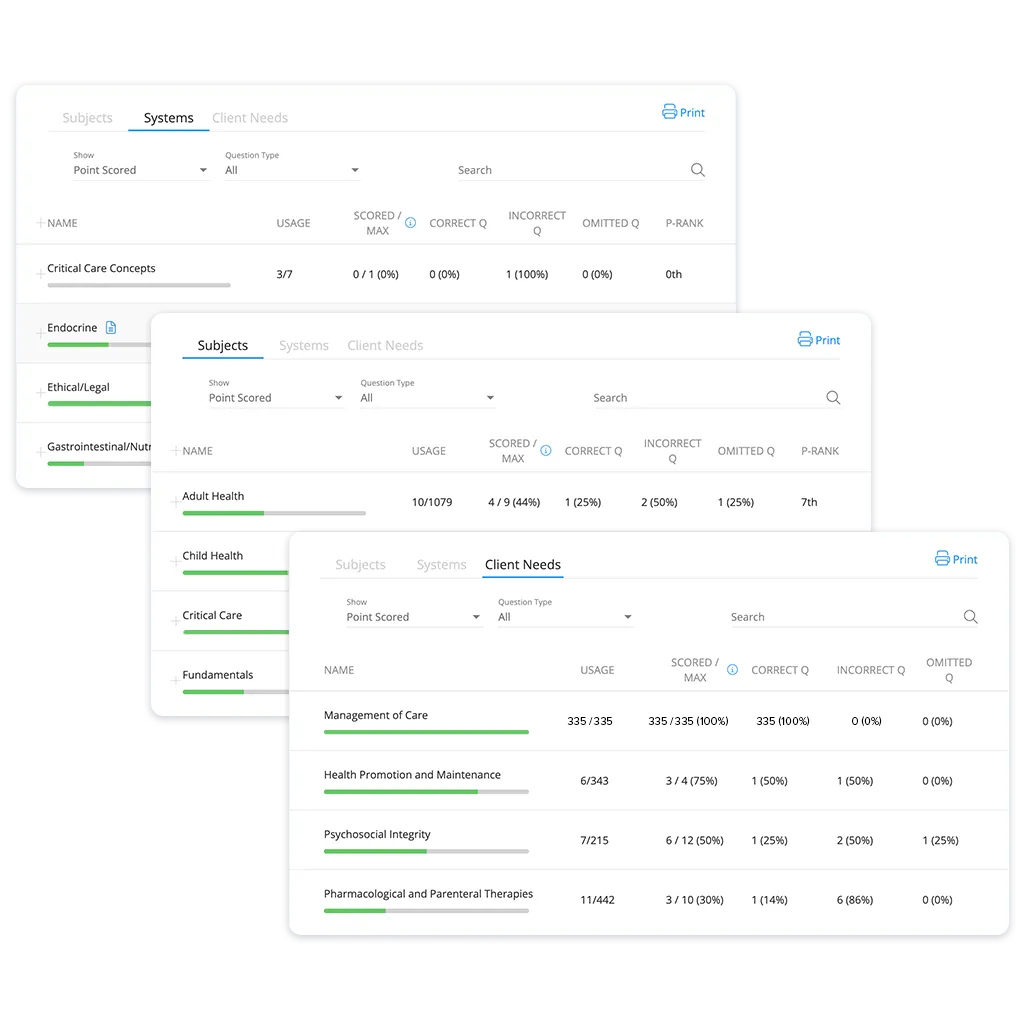The National Council Licensure Examination (NCLEX®) is a monumental milestone for aspiring nurses, serving as the ultimate test of their readiness to enter the profession. Achieving success on the NCLEX is a personal triumph and gateway for students to fulfill their dreams of becoming registered nurses. However, mastering the Next-Generation NCLEX (NGN) requires more than academic knowledge. It demands:
- Strategic study skills
- Effective test-taking strategies
- A deep understanding of one's strengths and weaknesses
- The ability to apply learned knowledge in clinical case scenarios
In this guide, we will explore how the NGN was developed, what the new format means for students taking the test, and how repeat test takers can use their candidate performance report (CPR) to refine their study skills, identify areas for improvement, and formulate an individualized study plan. We will then examine how to use UWorld Nursing performance reports to maximize your chances of passing the NCLEX and boost your confidence.
The NGN and Its Application to Practice
With the evolution of nursing licensure examinations, the NGN has emerged as a transformative force in assessing candidates' clinical judgment and decision-making abilities to meet the needs of a burgeoning patient population grappling with complex health issues. It was developed by the National Council of State Boards of Nursing (NCSBN) through a rigorous collaboration involving nursing educators, practitioners, regulatory bodies, and testing experts.
As part of this evolution, the NGN introduces an updated version of the candidate performance report, a personalized feedback tool designed to provide valuable insights into your performance on the exam.
The NCLEX Candidate Performance Report
Understanding the Candidate Performance Report (CPR)
The CPR highlights areas for improvement by offering a breakdown of the candidate's strengths and weaknesses. By leveraging this invaluable feedback, candidates can tailor their study approach, focus on areas of weakness, and refine their test-taking strategies to succeed the next time they take the exam. The CPR correlates with the domains outlined in the NGN NCLEX-RN or NCLEX-PN test plans. By understanding that correlation, candidates can utilize this information to enhance their study strategies.
How to Use the CPR to Pass The Next Time
Consider your exam preparation through a nursing lens to get the most out of your NCLEX CPR. That is to say, apply the five steps of the nursing process: assessment, diagnosis, planning, implementation, and evaluation.
1. Assess Your Strengths and Weaknesses
The first step in utilizing your CPR is carefully reviewing the feedback. Pay close attention to the breakdown of your performance across different content areas, cognitive levels, and clinical judgment dimensions. Identify areas where you performed well and areas where improvement is needed. By understanding your strengths and weaknesses, you can prioritize your study efforts and allocate more time to areas that require additional attention.
2. Diagnose the Source of Your Weaknesses
Armed with insights from your CPR, lay the groundwork for creating a new study plan that addresses your weaknesses. Break down your study plan into manageable goals and allocate dedicated time for each content area or cognitive level. Be sure to dedicate time to domains where you attained a rating near or below the passing standard.
3. Develop a New Study Plan and Schedule
Once you have a better idea of what went wrong with your initial study strategy, it’s time to develop a new one. To ensure your study materials cover all the domains you need to know for your exam, consider using a targeted NCLEX resource. This focused approach offers several advantages:
- Reduced Cognitive Load: A single, trusted source ensures a consistent learning style and question format, minimizing the mental effort needed to adapt to different materials.
- Deeper Understanding: Thoroughly exploring concepts within one resource fosters stronger knowledge retention than skimming various sources.
- Targeted Practice: Look for a resource that offers a vast pool of practice questions aligned with the NCLEX format and difficulty level, building confidence in your test-taking abilities.
While a primary study resource is key, you should also consider supplemental materials:
- Official NCLEX Resources: Utilize practice tests or study guides from the NCSBN for a definitive understanding of the exam format and content.
- Targeted Weaknesses: Explore free resources like YouTube lectures or NCLEX Question of the Day videos specific to your weaker topic areas.
Focusing on a high-quality resource and strategically supplementing your learning can optimize your NCLEX preparation and increase your chances of success. Remember to integrate study methods that align with your learning preferences. We strongly encourage students to focus on NCLEX-style practice questions with detailed answer explanations. You may also consider flashcards, concept maps, and group study sessions. Practice assessments are another useful tool for tracking your progress, identifying areas for improvement, and adjusting your study plan accordingly.
4. Implement Your New Study Strategy
Now that you have a plan in place, it’s time to implement it. The most important parts of this step are to remain consistent, pace yourself, and avoid burnout. If you have more time to dedicate to your studies, great! Add a little bit more each day. If you’re starting to experience signs of burnout, it may be worth it to reduce your daily workload. The best NCLEX study plans have built-in flexibility. Don’t be too hard on yourself if you need to adjust as you prepare, and try to include self-care in your routine.
5. Evaluate Your Progress
As you advance through your study plan, reflect on your study strategies and adapt them to address the challenges you experience. Be open to feedback and willing to adjust your approach based on your performance. Periodic self-assessments and practice exams can be very helpful here.
We suggest using timed self-assessments that reflect the real testing environment and question types to evaluate your exam readiness. It’s one thing to understand the material, but it’s another to recognize it and apply it in a time crunch, especially with the NGN’s new item formats. Practicing under simulated exam conditions is particularly useful in the weeks before your NGN exam. Getting accustomed to what you’ll experience on exam day can be mentally and emotionally beneficial and allow you to work on test-taking and stress-management strategies.
Consider seeking guidance from experienced mentors, educators, or nursing tutors who can provide valuable insights and support as you prepare for the exam. Ultimately, practice is key. The more you simulate exam conditions, the more confident you'll feel on test day.
How UWorld Nursing Performance Reports Enhance Targeted Studying
Similar to NCLEX candidate performance reports, UWorld Nursing performance reports measure your question bank performance by Subjects, Systems, and Client Needs categories:
- Subjects: This tab breaks down your performance by topics like "Adult Health,” and lists related Systems such as “Cardiovascular" and "Endocrine" under them.
- Systems: This tab organizes your results by body systems like “Cardiovascular” or “Endocrine” and lists related Subjects under them.
- Client Needs: This tab mirrors the NCLEX exam and categorizes your performance into "Management of Care" and "Psychosocial Integrity."
You can also evaluate your performance using traditional and NGN item types. You can receive valuable, accurate insights into your strengths and weaknesses across NCLEX test plan domains and question styles.
Cognitive Levels
The NCLEX exam utilizes Bloom's Taxonomy to categorize the cognitive level required for each question. This framework emphasizes applying knowledge, skills, and judgment, reflecting the core requirements of nursing practice. As a result, a significant portion of NCLEX questions fall within the application or higher levels of Bloom's Taxonomy, demanding a deeper understanding and analysis of nursing concepts.
UWorld recognizes that using low-level, knowledge-based questions to memorize facts isn't the most effective way to prepare for the NCLEX. While these questions might help you recall a specific detail, they don't equip you with the critical thinking skills necessary for real-world nursing scenarios.
Therefore, UWorld provides thousands of NCLEX-style questions that span various subjects and topics. In fact, 90% of users report that UWorld's questions are the same level of difficulty or more difficult than the questions they encountered on the NCLEX. These questions force you to apply your knowledge, preparing you for the diverse challenges the NCLEX may present on test day.
Putting You in a Position to Succeed
For candidates taking the Next Gen NCLEX for the first time, UWorld Nursing performance reports serve a similar purpose to the candidate performance reports provided to repeat test-takers. Both offer insights into your performance across different content areas and cognitive levels, allowing you to identify areas of strength and weakness. By leveraging the information provided, you can tailor your study plan, focus on areas where improvement is needed, and maximize your chances of success on the NGN exam.
With dedication, perseverance, and the right resources, mastering the NCLEX is within reach, paving the way for a rewarding career in nursing. By embracing a proactive and strategic approach to exam preparation, you can confidently navigate the NCLEX, knowing you have the tools and support needed to succeed.









